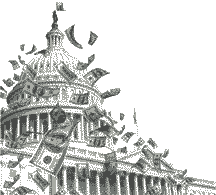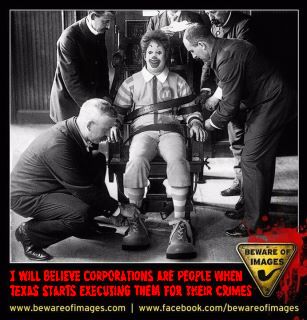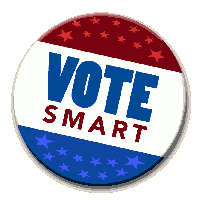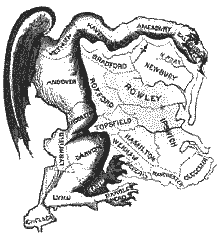This wide- and large- screen layout
may not work quite right without Javascript.
Maybe enable Javascript, then try again.
Better Government
We in the U.S. are fortunate to have quite a good government. Good isn't perfect though - let's further improve our government, making it even better than it already is. Although topics like rationalizing the Electoral College are intriguing from a theoretical standpoint, to me they're secondary. The really important next round of improvements are:
Refinement #1 - Get The Money Out Of Politics
Wouldn't it be nice for us in the U.S.
to not have to bite our tongue whenever someone jokes
we have the best legislature money can buy?
And to not be bombarded with quite so many advertisements
 during election campaigns?
And to have laws written by our legislators themselves,
rather than by cozily connected industry lobbyists?
And to have legislators that work for us,
rather than for the political party structures
that help fund them?
during election campaigns?
And to have laws written by our legislators themselves,
rather than by cozily connected industry lobbyists?
And to have legislators that work for us,
rather than for the political party structures
that help fund them?
Besides weighing corporate influence and party influence too heavily, there's also the matter of keeping legislators too busy to work for us. Even after they're elected, legislators typically spend at least half their time on fund-raising activities. What if they were free to work for us full-time instead of only half-time?
Most of the money legislators get is spent on elections (much of it on showing and re-showing and re-showing all those short almost content-free TV ads). There's a simple solution: publicly funded campaigns, as in many European countries. (And nobody gets a blank check either - when limited funds run out, that's it.) Furthermore, use of public funds for campaigns should be mandatory and exclusive. Because of the historical development of our laws, it may in fact not be possible to have a law that de facto requires mandatory public campaign financing. In that case, it would be up to the electorate to de jure impress on candidates that they must commit to the public funding option: if a candidate uses any private or privately raised funds, don't vote for them ...ever ...no matter what.
A part of public campaign financing
is reversing the
citizens united
court decision.
When countries were overhauling their laws to allow
 corporations to continue beyond the lifetime of the original investors,
and to limit shareholders' liability to the amount of their shares
(rather than everything they owned),
the U.S. skipped a lot of legal complication
by simply treating corporations as persons.
But a negative consequence of that shortcut
has come back to bite us.
Our supreme court has now ruled that corporations
have the same free speech rights as people.
And since giving money to an election campaign is
interpreted to be an expression of free speech,
corporate donations to campaigns can't be arbitrarily restricted.
The net effect has been to halfway gut
what few campaign finance laws do exist in the U.S.,
and to give even more political influence to corporations.
corporations to continue beyond the lifetime of the original investors,
and to limit shareholders' liability to the amount of their shares
(rather than everything they owned),
the U.S. skipped a lot of legal complication
by simply treating corporations as persons.
But a negative consequence of that shortcut
has come back to bite us.
Our supreme court has now ruled that corporations
have the same free speech rights as people.
And since giving money to an election campaign is
interpreted to be an expression of free speech,
corporate donations to campaigns can't be arbitrarily restricted.
The net effect has been to halfway gut
what few campaign finance laws do exist in the U.S.,
and to give even more political influence to corporations.
You may know the name Lawrence Lessig from his efforts as the key motivator behind the Creative Commons licenses. Frustrated that the views espoused by Creative Commons gained traction everywhere except in congress, he determined the root of the problem was the influence of money on our politics. In fact, he's shifted his focus to getting the money out of politics. He's written a book about it: Republic, Lost: How Money Corrupts Congress--and a Plan to Stop It, which posits money in politics is a serious problem that needs to be taken very seriously.
Refinement #2 - Streamline Serial Elections Process
Our election campaigns are incredibly long. Our presidential election campaigns take far more than a whole year out of every four. Do you remain interested for that long? Our elections are inefficient: they require an awful lot of effort by each citizen, yet collect only a very small amount of information. Worse, they completely prevent citizens who can't spare parts of two days from participating fully - if a citizen has to take time off work, or arrange a babysitter, or whatever, they should at least only have to do it once (not twice as they do currently). Maybe the inefficiency helps explain why the U.S. typically has the lowest voter turnout rate of any democracy. Yet another problem: the candidates are quite often awfully polarizing.
We're so used to general elections in which there's one candidate from each party, we sometimes forget there's nothing in our constitution requiring it to be that way. Currently we permit primary elections to pre-select just one candidate from each party, delegating an awful lot of influence on presidential elections to a few early primary states such as New Hampshire. Do you think your own views are fully and accurately represented by those who live in New Hampshire? If the two best candidates happen to be from the same party, why not let them run against each other in the general election?
The differing natures of separate primary and general elections motivate candidates to run to the edge during the primary but then have a personality transplant and run to the middle during the general. We virtually require our candidates to say one thing for the primary election but something else for the general election. We already have plenty enough problems with politicians saying more than one thing, without giving them an incentive to dissemble even more.
Primary (or first round) and general (or runoff) elections typically don't poll the same electorate. There's often a month between one election and the other, yet it takes only a few days for a significant proportion of voters to change their minds. So general election voters often find they no longer like either candidate, even though they voted for one of them in the primary election. As a result, the message voters send to those who are elected is forced to be unclear right from the start.
Worse, separate elections encourage strategic voting, voting in the first round for somebody you don't really prefer in hopes of getting the right candidates into the second round while at the same time sending a clear message. Unfortunately even though it may make sense to each individual, the average of all the different individual decisions is so murky candidates can't understand what was intended to be clear. Separate primary and general elections keep tempting people to try strategic voting, even though it typically actually muddles both the message and the voting, and sometimes even results in the election of a candidate few actually favor.
All of this could be addressed by just one refinement: Have only one vote per election, by using a voting method that always fairly produces just one winner without any preliminary voting or separate runoff voting. Several such voting methods exist, and are already in common use in some other places worldwide.
We're so used to the one particular voting method
that was the best available a couple centuries ago when our country was founded,
we easily forget
there are in fact now a whole lot of
different voting methods:
 plurality, majority, first-past-the-post,
proportional, one-stage, two-stage, runoff,
and so forth.
Even restricting consideration to only voting methods
that can always have a single winner after only one stage,
there are many options:
various Condorcet methods, various Borda counts,
Instant Runoff Voting (IRV), Approval voting, Range voting,
and a host of modifications, refinements,
and combinations of more basic methods,
such as the Star voting method which might be though of as a combination of Condorcet and IRV methods.
It's been theoretically proven (Kenneth Arrow's Impossibility Theorem) that
none of them is mathematically perfect
(although all produce results superior to the primary/general two elections method);
there is no right answer.
So choice of voting method should focus on
simply matching the method to the need
(the current U.S. voting method seems to be an especially poor
match to what it's supposed to do).
plurality, majority, first-past-the-post,
proportional, one-stage, two-stage, runoff,
and so forth.
Even restricting consideration to only voting methods
that can always have a single winner after only one stage,
there are many options:
various Condorcet methods, various Borda counts,
Instant Runoff Voting (IRV), Approval voting, Range voting,
and a host of modifications, refinements,
and combinations of more basic methods,
such as the Star voting method which might be though of as a combination of Condorcet and IRV methods.
It's been theoretically proven (Kenneth Arrow's Impossibility Theorem) that
none of them is mathematically perfect
(although all produce results superior to the primary/general two elections method);
there is no right answer.
So choice of voting method should focus on
simply matching the method to the need
(the current U.S. voting method seems to be an especially poor
match to what it's supposed to do).
(A common complaint heard about newer voting methods is they're hard to understand. This seems sensationalist; after all most people drive their car without understanding exactly how its engine works. Looking a little deeper, the complainers often don't mean quite what they say; what they really mean is I can't figure out how to game this system. It's been mathematically proven that most newer voting methods are very difficult to game, in fact effectively downright impossible to game under real election conditions. We're so used to strategic voting that when faced with a system where it's not necessary —or even possible— we get irritated. Without the possibility of strategic voting, journalists wouldn't be able to write articles advising people how to vote. And with the difficulty of using polls to project the winner of an instant runoff election, journalists wouldn't be able to treat an election like a horse race. Most importantly, a big chunk of what political consultants do would go away. Now that's the sort of unemployment I can support.)
Currently IRV has the most support for a possible new voting method. Like many of the newer voting methods, it can be used (but doesn't have to be) to dispense with separate Primary and Runoff elections; it's relatively easy to explain, understand, and cross-check; it doesn't require significant re-education of voters that are used to plurality methods; and it's not a whole lot worse than more complicated methods that further reduce apparent flaws in some theoretical (bizarre?) cases.
Using Instant Runoff Voting to eliminate serial elections would shorten campaigns, give candidates less incentive to be polarizing, and stop officially enshrining political parties in our election process.
Refinement #3 - Minimize Gerrymandering
Gerrymandering is the practice of drawing nonsensical legislative district lines, to either empower or deemphasize a particular group, or most often to produce safe districts where the winner will almost always be from one political party. It's frequently used to give a significant advantage to incumbents, thus resulting in both firmly entrenched legislators who stay an awful long time and almost no real representation for the extra citizens in a district that aren't part of the biggest group but don't have enough voting power to select a different candidate.
 The practice is named for Elbridge Gerry,
who was a Massachusetts politician a long time ago
and was one of the signers of our Declaration of Independence.
The word is a combination of Gerry's name
and salamander,
which some of the districts looked like when mapped.
(The first cartoon map that led to the name actually shows a figure that looks more like a
dragon than a salamander
...but the term gerrygon apparently wasn't sufficiently memorable.)
The term has become firmly entrenched,
even though it probably isn't really accurate
and probably isn't fair to Governor Gerry.
It's clear that Gerry did
not invent the practice.
Nor seemingly was he the instigator behind
the particular use
the particular uses of the practice that resulted in the name.
In fact he was apparently against the practice,
although it was heavily used and abused by his party while he was in office.
The practice is named for Elbridge Gerry,
who was a Massachusetts politician a long time ago
and was one of the signers of our Declaration of Independence.
The word is a combination of Gerry's name
and salamander,
which some of the districts looked like when mapped.
(The first cartoon map that led to the name actually shows a figure that looks more like a
dragon than a salamander
...but the term gerrygon apparently wasn't sufficiently memorable.)
The term has become firmly entrenched,
even though it probably isn't really accurate
and probably isn't fair to Governor Gerry.
It's clear that Gerry did
not invent the practice.
Nor seemingly was he the instigator behind
the particular use
the particular uses of the practice that resulted in the name.
In fact he was apparently against the practice,
although it was heavily used and abused by his party while he was in office.
I thought -based on my schooling- that gerrymandering had been forbidden in the U.S. and never happened any more. It turns out the only thing that's legally forbidden is gerrymandering with the effect of denying representation to particular races; although other uses of gerrymandering are distateful, none of them are actually illegal. Once in a while the most egregious abuses of gerrymandering are punished, as Tom Delay from Texas and Tom Finneran of Massachusetts found out. Otherwise, gerrymandering is alive and well and occurs routinely and widely.
As currently used, gerrymandering's main effects are to:
- give incumbents a huge -almost unassailable- advantage in elections
- empower political parties in enforcing ideological purity on candidates
Redrawing legislative districts every once in a while has to be done because people move from place to place all the time. Redistricting is triggered by new information from the decennial U.S. census; it happens every ten years. Considerable personal judgment is required. There's no unique right answer; it can't just be done mechanically/mathematically. For example, should a suburb be in the same district as its rather distant center city, or grouped with nearby suburbs of other cities? So, some group of people has to be in charge of redistricting; there are three common options:
- The state legislature
- The judicial branch
- A citizen commission
Putting the legislature in charge is the worst option. Politicians -including those who will run for election within the new district boundaries- are to decide themselves where to draw those boundaries??? (In theory it's possible for a legislature itself to redraw districts in a fair way ...but in practice it doesn't happen very often.) Although neither of the other two options is perfect either, they're less subject to corruption than having the legislature itself do the redistricting. A combination of the two, with both judges and citizens serving on the redistricting commission, may be a very good idea. Some ways to minimize corruption of citizen commissions are to select members semi-randomly and to let those members serve only once.
It's realistic to expect such government improvements. In fact, some of them are already beginning to occur. For example these bellwether changes in the state of California were considered over a decade ago, leading to this redistricting reform. Instant Runoff Voting (also called Ranked Choice Voting) began to be seriously considered in the U.S. several years ago, and is now being used in many places.
Related Resources
Proposals for improving our government tend to be rather diffuse, and their proponents not so laser-focused as we're used to (the phrase herding cats comes to mind:-). So this list is probably notably incomplete and woefully out of date. Nevertheless it may help you discover groups of other people pursuing refinements to our government:
- The Coffee Party (same naming pattern as The Tea Party)
- Move To Amend
- Common Dreams (note in particular their comments about getting the money out of politics)
- War Is A Crime
- Human Rights First
 Chuck Kollars' other web presences include
Chuck Kollars' other web presences include